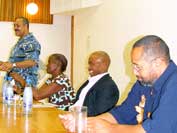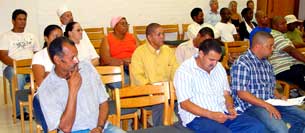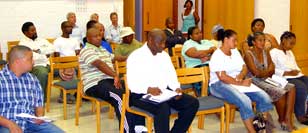
Jonathan Dreyer, Chair HBBOF
Maria Ngetu, Director HBBOF
Richard Dyantyi, Minister Local Government & Housing
Greg Louw, CEO HBBOF
|

 |
ISIDIMA, THE HOUT BAY HOUSING PROBLEM AND
BROAD BASED BLACK ECONOMIC EMPOWERMENT (BBBEE)
The Hout Bay Business Opportunities Forum (HBBOF) invited MEC for the Western Cape Provincial Local Government and Housing, the Honourable Minister Richard Dyantyi, to come and explain the “ISIDIMA” project, the road map to dignified communities.
This session was held on Monday the 31 March 2008 at 19H00p.m at the Hout bay Library Hall. It was well attended by representatives of different organisations. Rev. Jonathan Dreyer the MC for the evening, also Chairman HBBOF welcomed the guests and the Honourable Minister Dyantyi.
Gregg Louw of HBBOF gave a brief history of HBBOF, clarifying its Aims and Objectives.
Timothy Jacobs of HBBOF Advisory Council announced the upcoming Seafood Festival and explained how organisations can get involved. For further information regarding the Festival contact Timothy on 083 390-4966.
He also announced that Marketing Our Business (MOB) is in the process of organising a Hout Bay Jazz Festival for November 2008. People interested in the Hout Bay MOB and/or the Jazz Festival are invited to contact Andre Jacobs on 083 632-8976 at the Consulate and/or Rudolf Rieger on 082 584-4913.
It was a pleasure to announce that Rudolf Rieger, from Hout Bay, is now a Service Provider for ‘Umsobomvu Youth Fund’. Rudolf explained in short how Black Entrepreneurs could access the fund and service. For more info on provided services contact Rudolf on 082 584-4913 or click on:
UMSOBOMVU
Sue Gerber of AYZ Promotions also took the time to explain the DTI - 80/20 Fund and how black entrepreneurs can access it. Her contact details are available at the HBBOF office at the ‘Old Police Station Building/Yacht Club’.
Maria Ngetu, Director of HB BOF, then introduced the MEC Honourable Minister Richard Dyantyi.
LOCAL GOVERNMENT AND HOUSING
by MEC Richard Qubudile Dyantyi
Thank you for inviting me to address you on the Isidima, the housing challenges that faces this magnificent “Republic of Hout Bay” and opportunities to promote small business economic development through integrated human settlement development in the area.
Caught between the mountains and the cold blue Atlantic Ocean, Hout Bay is truly beautiful, but nowhere else in Cape Town is the contrast between the wealthy and the poor so visible and as stark as in Hout Bay.
Back in 2004 the Archbishop of Cape Town, Njongonkulu Ndungane, held meetings here in an attempt to provide a common stakeholder platform to address the holistic development of Imizamo Yethu and Hout Bay.
ISIDIMA
My department in partnership with SANCO recently hosted the ISIDIMA HUMAN SETTLMENT SUMMIT, which focused on raising the awareness of the profile of Isidima for implementation and secondly to create dialog and continued communication between government and civil society to accelerate housing delivery. Flowing from these engagements the following resolutions or areas of focus, which have specific application to the Hout Bay challenges, were highlighted.
- Backyard dwellers should to be treated the same as people living in informal settlements
- Role of financial institutions to be examined and enhanced to potentially increase access to housing (beyond GAP market interventions)
–Private Sector / Corporate social responsibilities should be used to provide housing
- Clear communication/education is required on how waiting lists and housing- demand-database works and it’s implications
- We need an increased focus on public rental stock
- We need to develop an effective Settlement Management Programme and Municipalities should constantly update information on informal settlements
- We should improve the communication between government and communities
- Government departments need to co-ordinate the prioritization and disposal of land
Government should engage on the issue of unused and under-utilised government and private buildings
- Affordable land should be made available for community facilities
The core focus of Isidima is influenced by three major shifts, which have emerged as a consequence of the gradual overall strategic shift towards a developmental state approach, which are summarised as follows:
- The shift from housing construction to “sustainable human settlements”
- The sustainable resource use
- The shift to real empowerment
These shifts in the way we deliver housing to the ever-increasing, more than 450 000 people on the Western Cape’s housing-demand-database, (waiting-list) requires a creative solutions and interventions.
Through the implementation of Isidima we aim to achieve the following objectives:
- Making the housing markets work for the poor
- Restructuring apartheid settlement patterns to bring them into the heartlands of our cities and towns where they are in close proximity to livelihood opportunities, public services, transport and social facilities
- Mobilizing and organising the savings and time of the urban poor as co-contributors of the solution that is required across a range of different contexts
- And gradually changing over to sustainable resource-use approaches with respect to energy, waste, water, sanitation, transportation and food supplies
DEVELOPMENT OF IMIZAMO YETHU AND HANGBERG
Imizamo Yethu
The Less Formal Township Establishment Act, Act 113 of 1991 (LEFTEA) has been amended, late last year, which has acceded to the process for the lifting of the current proclamation, to include the development of the controversial 16 hectares in Imizamo Yethu. Senior Officials of my department are working closely with the City of Cape Town to ensure that all processes are correctly followed to ensure the rezoning of the land for residential purposes, including roads and public spaces, and the details of the proposed development, are expeditiously finalised. A full public participation process will be followed to, amongst others, find common ground as to the nature of the development.
My department is in the process of approving a People Housing Process project in Imizamo Yethu (Makhukhanye) and our inspectors and housing administrators regularly meet with the project managers and beneficiaries to ensure expeditious progress on these. This project seeks to consolidate a portion of the serviced sites, which were approved in July 2005 and now need top structure-approval to be constructed through a People’s Housing Process.
A number of initiatives were taken to address the provision of proper accommodation through collaborations with NGO’s like DAG and others. During the past 10 years Imizamo Yethu received a lot of attention worldwide which saw the Irish millionaire Niall Melon emerged to support the South African government around housing delivery in Hout Bay. So far Phase 1 development of houses, totaling 405, was built. Phase 2 consists of 253 plots and Phase 3 will be 183 plots.
The Developer: Masakhane-Bantu Housing Association will be constructing units with a minimum size of 42m², which complies with the Breaking New Ground standards.
Hangberg
An application was also received from the City of Cape Town for the upgrading of 302 informal housing units in Hangberg. This project is also in its planning phase, with specific geo-technical and other outstanding specialist reports awaited, before approval can be considered.
I need to reiterate that my department embraces the principles of Inter-governmental relations and have regular meetings with the relevant departments, especially the Department of Environmental Affairs and Development Planning, to take care that low-cost housing development projects are handled with the necessary urgency. In this instance we have mutual understanding and commitment politically and officially that all stops are unblocked to ensure unconstrained processing of environmental and planning assessments.
Broad Based Black Economic Empowerment Through Human Settlement Development
The Department is committed to job creation and poverty alleviation. We are running various programmes that contribute towards our country’s efforts to address the First and the Second Economies. We have positioned some of our activities to respond to the country’s economic growth strategy, namely ASGISA i.e Accelerated and Shared Growth Initiative which aims to unlock some binding constraints to economic growth.
The construction sectors is one of the key sectors that have been challenged to contribute to the realization of Government’s objective of reaching a six percent gross domestic product growth from 2010 onwards and halve unemployment and poverty by 2014 (CIDB Report: 2006/2007).
The enabling factors to economic growth are the following among the others. The participation of small contractors and the general community in housing programmes. At National level, the National Departments of Housing and Provincial and Local Government committed themselves to the participation of Broad Based Black Economic Empowerment Groups into infrastructure sector. Both Departments have targets for the provincial departments to achieve in this regard. The Department’s section dealing with Economic Empowerment is serving on National Task Teams that are dealing with this issue of transformation and the provincial forums have been established to engage on these matters with municipalities, BBBEE groups and implementation agents.
Plans are afoot to engage BBBEE groups like yours on this matter. The Departmental BBBEE task Team will develop a roads show plan to reach out the communities to unpack the participation of small businesses in housing programmes.
There are various programmes that the Department is running and for your community to derive the benefits from. These are:-
- Peoples’ Housing Process (PHP) Projects
- Expanded Public Works Programme (EPWP)
- Upgrading of Informal Settlement Programme (UISP)
- Enterprise Development Services
- Contractor Development programme
People’s Housing process (PHP)
PHP has become popular in this area. The following professional services manage the processes in this programme and they can be converted into opportunities by small businesses: -
- Account administrators
- Builders and Suppliers
- Housing Support Staff
- Construction Controllers
- Facilitators
Expanded Public Works Programme (EPWP)
In his State of the Nation Addresses since 2003, President Thabo Mbeki committed the country to the creation of 1 million jobs by 2008. The Department is contributing to this initiative by aligning some of its housing programmes with EPWP principles, namely:-
- Provision of short to medium term for the unemployed
- Facilitate accredited training for participants
- Intake on a project should be 60 women and 30 youth
The UISP programme in Hangberg can be aligned with EPWP guidelines to achieve the above.
Enterprise Development Programme
The Economic Empowerment unit is a source of information on BBBEE matters in the Department. It provides the required advice to emerging contractors on an ongoing basis. The unit advises small business on industry regulation (SARS, NHBRC, CIDB etc), company registration especially cooperatives, access to funding and many more.
Contractor Development Programme
Small businesses are confronted with lots of challenges. One of their challenges is the lack of skills in construction. This challenge is being addressed in various ways. Construction Training has taken in the last 2 years for emerging business to contribute in addressing the issue of skills.
Partnership with NHBRC
The Department is currently in partnership with the National Home Builders’ Registration Council (NHBRC) to provide free training for emerging contractors who are registered with the NHBRC.
Contractors who are interested in this training which covers Bricklaying, Roofing and Plastering can contact the department.
< End of Minister's Note >
Question and Answer Session
The following questions/topics arose and answers are partially still pending:
- Why does Hangberg community not have a Community Development Worker? (CDW)
- One should not look at alternatives to fishing rather supplementary to compliment it
- How does the impoverished Hout Bay community benefit from the high cost developments in the area?
- Illegal people come into our country and village and buy RDP houses. They also set up businesses. How are you going to deal with this matter and also the business owners who exploit these ‘illegals’ with cheap labour at the expense of our local people?
- When are the 61 single row houses going to be transferred to the people who have been living in those house since the nineteen sixties?
|
|
Print this window |
|

